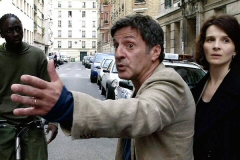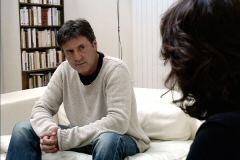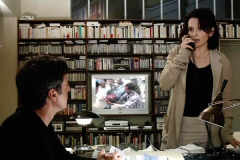Caché (Hidden) (Michael Haneke, 2005)
 Caché, Michael Haneke’s latest film is a superb piece of work, made by a
master of the form, yet I’m not quite sure how much I actually like it. By
design, it’s a purposely-unsatisfying contraption, centered on the French
public’s (and government’s) denial of the Algiers atrocities. Beginning with
a relatively standard thriller setup (a family receives a mysterious videotape
of their own home in the mail with no idea who made it), the director crafts a
vicious attack on bourgeois complacency, which he suggests is founded on denial
of any political or personal unpleasantness.
Caché, Michael Haneke’s latest film is a superb piece of work, made by a
master of the form, yet I’m not quite sure how much I actually like it. By
design, it’s a purposely-unsatisfying contraption, centered on the French
public’s (and government’s) denial of the Algiers atrocities. Beginning with
a relatively standard thriller setup (a family receives a mysterious videotape
of their own home in the mail with no idea who made it), the director crafts a
vicious attack on bourgeois complacency, which he suggests is founded on denial
of any political or personal unpleasantness.
 There’s a great scene in this film where intellectual family man Georges
(Daniel Auteuil) tells his wife (Juliette Binoche) that he’s been withholding
his suspicions about the identity of the perpetrator because he didn’t want to
upset her. Earlier in the film, the protagonist’s mother doesn’t wish to
relive an unpleasant memory of a time when she failed a young orphan. Perhaps
most importantly, there’s the bubbling discontent in the couple’s son, who
unexpectedly lashes out at his mother. This theme of latent ill will builds
gradually, culminating in an ending that sees that sense of calm perhaps
irrevocably upended. Appropriately leaving you stranded with a “need to
know” that you didn’t posses at the film’s start, watching the movie is
ultimately an exercise in frustration. Some viewers have offered hints about the
meaning of the final shot, or the identity of a mysterious character that is
glimpsed throughout, but since we’re not even certain whether that last shot
is being shot from the stalker’s or the director’s camera (the decision to
make the long static “video” shots indistinguishable from the rest of the
film was a brilliant move by Haneke that creates the paranoia that the
protagonists is being watched in each scene), these bits of information only
open more lines of questioning.
There’s a great scene in this film where intellectual family man Georges
(Daniel Auteuil) tells his wife (Juliette Binoche) that he’s been withholding
his suspicions about the identity of the perpetrator because he didn’t want to
upset her. Earlier in the film, the protagonist’s mother doesn’t wish to
relive an unpleasant memory of a time when she failed a young orphan. Perhaps
most importantly, there’s the bubbling discontent in the couple’s son, who
unexpectedly lashes out at his mother. This theme of latent ill will builds
gradually, culminating in an ending that sees that sense of calm perhaps
irrevocably upended. Appropriately leaving you stranded with a “need to
know” that you didn’t posses at the film’s start, watching the movie is
ultimately an exercise in frustration. Some viewers have offered hints about the
meaning of the final shot, or the identity of a mysterious character that is
glimpsed throughout, but since we’re not even certain whether that last shot
is being shot from the stalker’s or the director’s camera (the decision to
make the long static “video” shots indistinguishable from the rest of the
film was a brilliant move by Haneke that creates the paranoia that the
protagonists is being watched in each scene), these bits of information only
open more lines of questioning.
 Caché ‘s brilliant script keeps the audience guessing, deriving its
meaning from that open-ended process. Haneke’s method is to use the
audience’s knowledge of generic conventions against them in order to create an
expectation in the viewer that is never fulfilled. The tantalizing hints that
the director gives throughout only further stoke our determination to solve a
mystery that may not even have a solution within the film. Furthermore, because
the audience is familiar with the way that tensions escalate in thrillers like
this, the threat of violence simmers throughout. Caché doesn’t just
retard our desires for narrative resolution. It assaults our sense of
entitlement regarding on-screen justice with the same gusto with which it
attacks its contented principal characters.
Caché ‘s brilliant script keeps the audience guessing, deriving its
meaning from that open-ended process. Haneke’s method is to use the
audience’s knowledge of generic conventions against them in order to create an
expectation in the viewer that is never fulfilled. The tantalizing hints that
the director gives throughout only further stoke our determination to solve a
mystery that may not even have a solution within the film. Furthermore, because
the audience is familiar with the way that tensions escalate in thrillers like
this, the threat of violence simmers throughout. Caché doesn’t just
retard our desires for narrative resolution. It assaults our sense of
entitlement regarding on-screen justice with the same gusto with which it
attacks its contented principal characters.
68
09.20.05
Jeremy Heilman